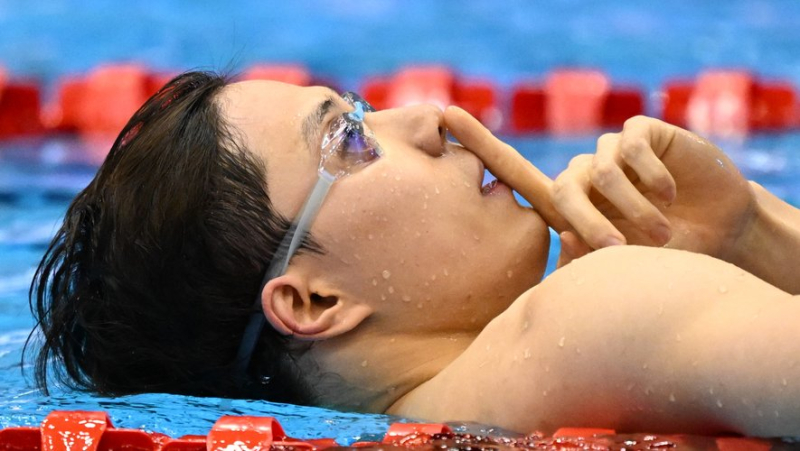“China files”: what we know about the doping scandal involving Chinese Olympic medal swimmers

Selon une enquête de la chaîne allemande ARD et du “New York Times”, 23 nageurs chinois ont été contrôlés positifs en 2021, sans être inquiétés. ILLUSTRATION MAXPPP – Xia Yifang
An investigation published on Saturday April 20 by the New York Times and the German channel ARD revealed positive tests concerning 23 Chinese swimmers, seven months before the Tokyo 2021 Olympic Games .
Three months before the opening ceremony of the Paris Olympic Games (July 26-August 11), Chinese swimming, already splashed in the past by several cases of doping, finds himself once again at the center of revelations.
An investigation carried out by German public television ARD and the New York Times claims that 23 Chinese athletes, including several future Olympic champions in Tokyo, tested positive in early 2021, without having been sanctioned.< /p>
In a video report which should be broadcast over the weekend, the ARD explains having received documents, renamed "China files", from a report of ;rsquo;investigation by the Chinese National Anti-Doping Agency (CHINADA) regarding a competition in January 2021 in Shijiazhuang.
23 swimmers involved
During this competition, twenty-three of the best Chinese swimmers tested positive for trimetazidine, a substance banned since 2014 on the grounds that it improves blood circulation.
This same substance was found in analyzes carried out at the end of 2021 on the Russian skater Kamila Valieva, a positive test revealed during the Beijing Winter Olympics in 2022 and which resulted in her suspension for 4 years from the 25th. ;nbsp;December 2021.
Of the 23 Chinese people who tested positive at the start of 2021, 13 participated in the Olympic Games a few weeks later, including Zhang Yufei, quadruple medalist in Tokyo: gold in the 200m butterfly and 4x200m ;nbsp;m freestyle, silver on 100 m butterfly and mixed relay 4×100 m medley.
Wang Shun, Olympic champion in Tokyo in the 200m medley, is also one of the Chinese swimmers tested positive at the start of 2021, as well as Yang Junxuan, silver medalist with Zhang Yufei in the relay mixed.
An investigation was carried out by the Chinese Ministry of Public Security, then a report was written by the Chinese Anti-Doping Agency (Chinada) and submitted in March 2021, concluding that there was food contamination. No provisional suspension was pronounced between the positive controls and the submission of the report.
Not possible to refute contamination
In a press release published on Saturday, WADA gave explanations on how it proceeded. Due to restrictions at the time linked to the Covid-19 pandemic, its investigators were unable to go to the site.
Independent experts were, however, consulted to test the contamination hypothesis put forward by Chinada. WADA concluded that it was unable to refute the possibility of contamination as the source of trimetazidine. 60~/em>. Consequently, no negligence or fault has been held against the athletes. WADA therefore considered that an appeal was not justified.
In 2022, the International Testing Agency (ITA) raised questions regarding misreporting of trimetazidine samples. "This has been independently verified by the "Investigation and Intelligence" of WADA, which concluded that proper procedures were followed and that there was no evidence of wrongdoing", explained the AMA.
An explanation which did not convince the boss of the American anti-doping agency (USA), Travis Tygart. In a statement, he accused the AMA and Chinada of having "so far pushed these positive cases under the rug by failing to fairly follow the international rules that apply to the rest of the world".< /p>
"Mr. Tygart’s accusations are politically motivated and made with the intent of undermining WADA’s work to protect a clean sport around the world. The AMA notes that the comments were made without providing the slightest proof", the AMA reacted in a press release.
The Montreal-based agency recalls that it has accepted similar conclusions from USADA in the past for cases of contamination of American athletes.
Already several sandals
In the past, several doping scandals have affected Chinese swimming. At the 1994 Asian Games, seven Chinese swimmers tested positive for steroids. In 1998, swimmer Yuan Yuan was banned after Australian customs discovered large supplies of growth hormone in her luggage during the World Championships in Perth.
Swimming star, three-time Olympic champion and eleven-time world champion Sun Yang has been suspended since February 2020 for four years and three months after destroying with a hammer a sample of his blood taken during of an unannounced doping test at his home in September 2018.




